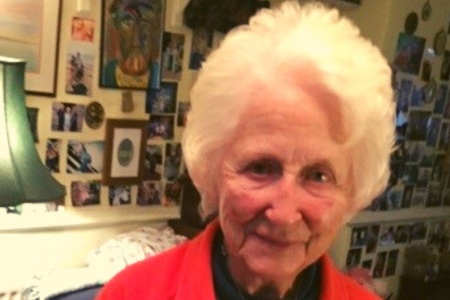As a volunteer you are likely to develop close relationships with the older people you support. But from time to time, as you develop trusting and long-lasting friendships, there could be some topics that make you feel uncomfortable. You might not know how to react, what to say, and what is expected from you as a volunteer.
We want to ensure that:
- You, and those you support, always feel protected.
- You’re able to create a safe, consistent and respectful setting in which relationships with others can develop.
The following scenario is about managing uncomfortable conversations. You can find the answers to the questions at the bottom of the page.
Scenario
Petra is 80 and has been a tea party guest for a while. Petra and her driver, Linda, have developed a good friendship with each other. The short drives from Petra’s house to the various hosts’ houses are always full of interesting conversations. Sometimes Linda deliberately takes the scenic route for Petra to enjoy and have more of an opportunity to talk about herself and her past. Petra is outgoing and was always a very energetic person. She has travelled to many exotic places and has interesting tales from these trips.
Recently, the stories Petra has been sharing have become more about her intimate and private life, which makes Linda feel uncomfortable, she's tried to change the subject on a few occasions but Petra keeps bringing it back to subjects that Linda isn’t comfortable hearing about.
Linda thinks Petra shares these experiences because she trusts and feels safe with her and doesn’t have many other people who she can talk to about her feelings and what is going on in her private life. Although she finds these conversations embarrassing, she doesn’t challenge Petra and continues to listen.
One day, when Linda picks Petra up from her house, she notices a much younger man leaving. Petra has told Linda that she’s in an intimate relationship with this man. He’s been coming to her house regularly. Petra has felt happy and comfortable talking about him and has made it clear that their relationship is consensual and that they both enjoy spending time together.
Having seen the man that Petra is having a relationship with, she became really worried about their age gap. Petra’s loneliness and kind-heartedness may have created an opportunity for others to take advantage, and she could be a victim of abuse and exploitation.
Questions
1. What would you do if an older person’s conversations made you feel uncomfortable? (More than one answer may apply):
a.) I would try to change the subject, as Linda did.
b.) I would listen to the conversations. Because the older person feels comfortable talking about their private life, it doesn’t matter if I feel uncomfortable.
c.) I would stop the conversation and explain that there are boundaries we need to stay within, and certain conversations are inappropriate and should be avoided.
2. Are intimate relationships like Petra’s always a potential safeguarding concern that should be reported? (More than one answer may apply):
a.) Yes, the age gap and the loneliness of the older person is an important indication that Petra may be a victim of exploitation.
b.) No, Petra clearly stated that the relationship is consensual.
c.) No, there has been no mention of abusive behaviour, or indications that Petra is feeling stressed or worried.
d.) Yes, because sometimes older people may not realise that they are in an inappropriate relationship.
3 What could Linda do differently? (More than one answer may apply):
a.) She could set boundaries for their conversations so that she won’t feel uncomfortable.
b.) She should talk Petra out of the relationship because it’s not an appropriate relationship.
c.) She could ask more questions to make sure Petra is safe and not worried about anything.
d.) If unsure, Linda could share her concerns with her group coordinator.
Answers
Q1: a and c
You can change the subject of the conversation. This can indicate that you don’t feel comfortable continuing particular conversations and the older person may not raise the subject again. However, if it continues, it’s okay to stop the conversation and explain that certain topics, such as details of intimate relationships, are outside the boundaries of your volunteering role as a befriender. However, if they need advice and support you might be able to signpost them to relevant organisations.
Q2: b, c, & d
While the age gap can be a possible sign for abuse and exploitation, in this scenario, it’s not necessarily the case. Petra has clearly mentioned that it is a consensual relationship. Petra is happy and Linda didn’t pick up any signs of anxiety, or a change in her behaviour. Before seeing the young man, Linda didn’t pick up any other signs that Petra might be in any kind of inappropriate relationship or is being abused. However, sometimes older people may not realise immediately that they are being abused or may be the victim of a scam and asking further questions will help you identify any warning signs. For example, Linda could ask if Petra feels safe in his company, whether she has noticed any suspicious behaviour and if she’s been asked for big sums of money or she’s bought him expensive gifts at his request. This is a good conversation to have that helps to raise awareness of scams and fraud. If you’re unsure, you can always share your concerns with your group coordinator.
Q3: a, c, & d
According to the Mental Capacity Act (2005), people with mental capacity have the right to make their own decisions about their own private lives, unless and until this has been proven to be wrong. In this scenario, Petra has the capacity to make her own decisions, and although the age gap may seem inappropriate for you, it may be the right decision for her. For further information you can refer to the NHS Mental Capacity Act.
It's important that Linda is able to say 'no' to Petra and feel OK about doing this. Please refer to boundaries and managing expectations on our website and you can also seek advice from your group coordinator.
You will also find signposting to useful links and organisations on our website. You can use this to guide older people to contact professionals and get advice, should they need it.
-
View
More news

"None of us get out of here alive and I’m thankful for every day that I have on this earth.”
82 -year-old Jane is a member of our West Yorkshire online activity group and has an inspirational approach to life.
She shares her story, from running away to become a nurse to being the oldest person to donate an organ at Leeds Hospital.
By Re-engage

Keeping yourself and others safe in a heatwave
It may seem appealing to be outside in the sunshine, but, with this week's record heatwave, it’s important to know how to cope with the stifling heat and understand the risk factors, so you are prepared for when it returns.
Stay cool, stay safe and stay in touch with those who are more vulnerable.
By Re-engage

